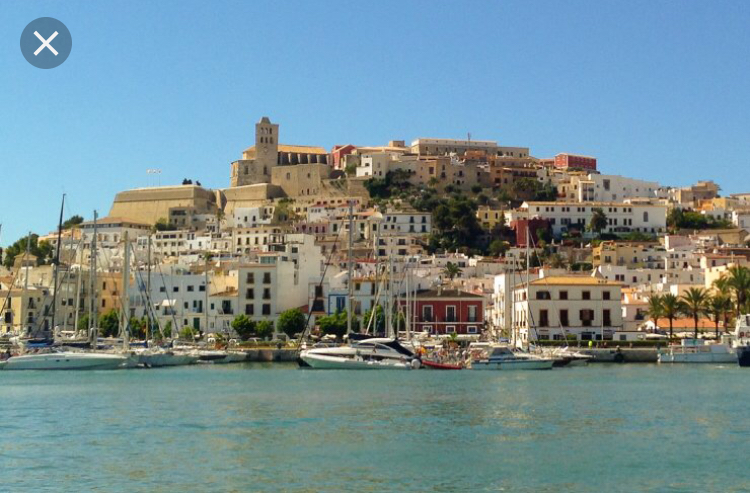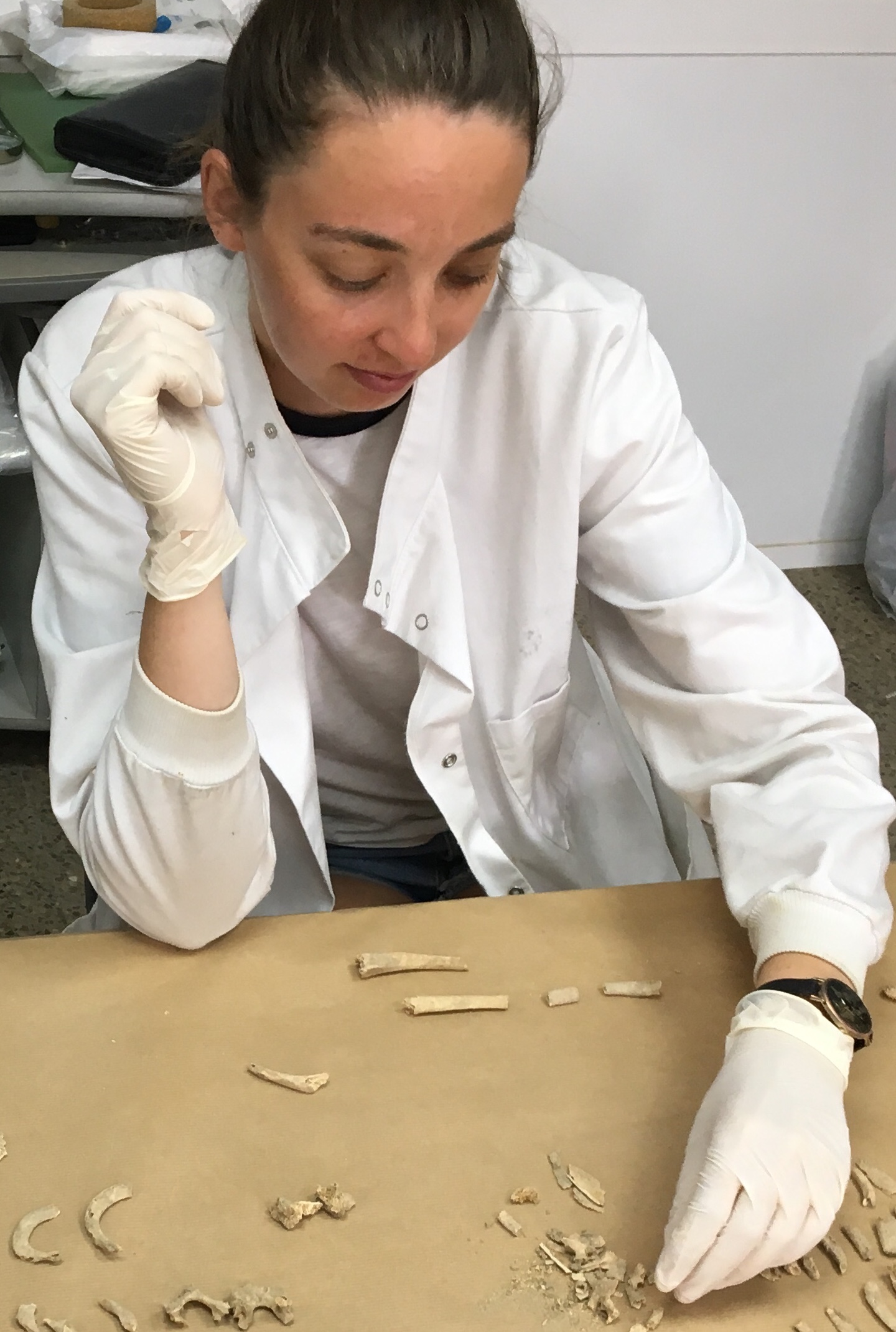Human skeletal analysis in Ibiza.
10/07/2019

This June 2019, Cranfield Forensic Institute staff Dr Nicholas Márquez-Grant and two MSc in Forensic Archaeology and Anthropology students, Thora Gundersen and Louise Tonks, worked in Ibiza for almost three weeks.
Ibiza, of course, famous for its world renown nightclubs, its beaches and the focus for Hippy migration in the late 1960s and early 1970s, is a World Heritage Site.
In fact, this year marks 20 years since the Spanish Island was categorised by UNESCO for its old Ibiza town (founded c. 2500 years ago), for the Phoenician (7th century BC) settlement by Sa Caleta beach, for its 6th century BC cemetery, one of the largest in the world for the Punic (Carthaginian) culture and for its underwater nature.
Thus, the team from Cranfield Forensic Institute assisted the Town Hall in examining human skeletons of the Mediaeval population from Ibiza.

According to Dr Nicholas Márquez-Grant, ‘the examination of human remains from the past can tell us much about mortality rates, health and disease, levels of violence, migration and diet of past populations’. The project in Ibiza focused on examining a number of cemeteries from the town where students had to identify each bone and tooth meticulously to obtain the evidence that life had left on the human remains themselves. The students also obtained information on the age-at-death, biological sex and stature of these individuals. All the teeth and bones were examined for signs of disease such as dental caries, osteoarthritis, infection and trauma.

“The team worked very well with the local archaeologists and apart from the lab work and the great food and frequent beach visit on the day off, much of the time was spent learning about Ibiza’s heritage. This included a guided tour around the old town visiting the Medieval Islamic walls, the Renaissance walls; as well as a guided tour around the rock cut tombs at the Museum of Puig des Molins”
Thora Gundersen
Students Louise Tonks and Thora Gundersen were interviewed on the project…
What and where did you study before starting your course with Cranfield?
L: Before coming to Cranfield I studied forensic and and analytical science at RGU up in Aberdeen. It was a great course but I graduated right at the same time the oil fell and there were no jobs left. I’m glad I came and did this course though.
T: I completed my undergraduate degree in Forensic Science at the University of Lincoln in 2018.
What piqued your interest in forensics and anthropology?
L: I always enjoyed sciences at school but I honestly don’t remember what made me choose forensics. I guess I just found it more interesting than everything else. As for anthropology, we had a module in my undergrad and it was by far my favourite.
T: I had a couple modules in forensic anthropology in Lincoln and I found that very interesting. I chose to go on field trip to Guatemala to learn more about it in addition to writing a dissertation in that field.
What was the best finding or experience from this field trip?
L: If only we had done this trip before the exam! I can’t believe how much my knowledge, skills and abilities developed over the course of this trip. I learn best by repetition so examining skeletons everyday for two weeks really helped! It was also a little surreal when you think about it. An actual human lying on a table in front of me that was around 1000 years old and here I was accidentally placing fragments from their pelvis in their shoulder. I hope they forgive me! 😂
T: I really appreciated the hands-on experience I gained from working through the skeletons as a team. Each skeleton posed a different challenge and taught me something new. I also enjoyed learning about the history of this population and seeing where it all took place.
What kind of equipment are you using, and how is the learning structured?
L: We use very little equipment. Unlike my undergrad, there is very little expensive instrumentation for me to break. Anthropology is very simple. Lay out the bones, examine them and record them. The only equipment we used on the trip was callipers and measuring tapes and a camera.
The learning on this module and all the others in my course can be quite intense at times. One module is a week of 9-5 learning which can be a lot to take in all at once. It’s also very difficult to juggle a part time job too so when you finally get a day off it feels great to just chill. The lecturers are very supportive though and it’s clear they get just how stressed out we are sometimes which means a lot.
T: We used recording forms to write down all the information about the remains, a camera to photograph and measuring tools. The learning was structured in a very practical way. We did everything ourselves from opening the boxes, positioning the skeleton in the anatomical position on the table, photographing and recording. Nick was supervising this process and checked that everything was correct.
What can we learn from looking back at this kind of historical site?
L: I’m planning on comparing this site to others from around the same time period in Ibiza. I’m particularly interested in pathology which will give indications of lifestyle and mortality rates. As part of our examination process, we created a biological profile which includes age, ancestry and sex. It’s interesting to see if there is any correlation between this and the different sites to determine if different people were buried in specific sites.
T: We can learn about the mortality rates and what diseases were prevalent in the population. We can learn about their culture through funerary practices and through their diet. We also learned how much the culture have changed in Ibiza.
What are your ambitions for the future?
L: I would like to continue with forensic anthropology, in particular working for somewhere like the UN. a lot of experience is needed for that though so I need to find a job before then.
T: I would like to continue working in this field and I would love to get some more work experience to do so.
What is your favourite thing about the course?
L: There are so many great things about this course how do I choose one?! The lecturers are great and it feels even more relaxed here than it did at my undergrad. The knowledge and skills I have developed during my time here are definitely one of the best things about this course.
We thank our hosts and colleagues in Ibiza who welcomed us with open arms and looked after us very well!

Categories & Tags:
Leave a comment on this post:
You might also like…
Company codes – CUSIP, SEDOL, ISIN…. What do they mean and how can you use them in our Library resources?
As you use our many finance resources, you will probably notice unique company identifiers which may be codes or symbols. It is worth spending some time getting to know what these are and which resources ...
Supporting careers in defence through specialist education
As a materials engineer by background, I have always been drawn to fields where technical expertise directly shapes real‑world outcomes. Few sectors exemplify this better than defence. Engineering careers in defence sit at the ...
What being a woman in STEM means to me
STEM is both a way of thinking and a practical toolkit. It sharpens reasoning and equips us to turn ideas into solutions with measurable impact. For me, STEM has never been only about acquiring ...
A woman’s experience in environmental science within defence
When I stepped into the gates of the Defence Academy it was the 30th September 2019. I did not know at the time that this would be the beginning of a long journey as ...
Working on your group project? We can help!
When undertaking a group project, typically you'll need to investigate a topic, decide on a methodology for your investigation, gather and collate information and data, share your findings with each other, and then formally report ...
From passion to purpose: My journey at the Pinnacle of Aviation
By: Sultana Yassin Abdi MSc Air Transport Management, Current Student Born and raised in the vibrant landscape of the UAE, with roots stretching back to Somalia, my life has always been ...






